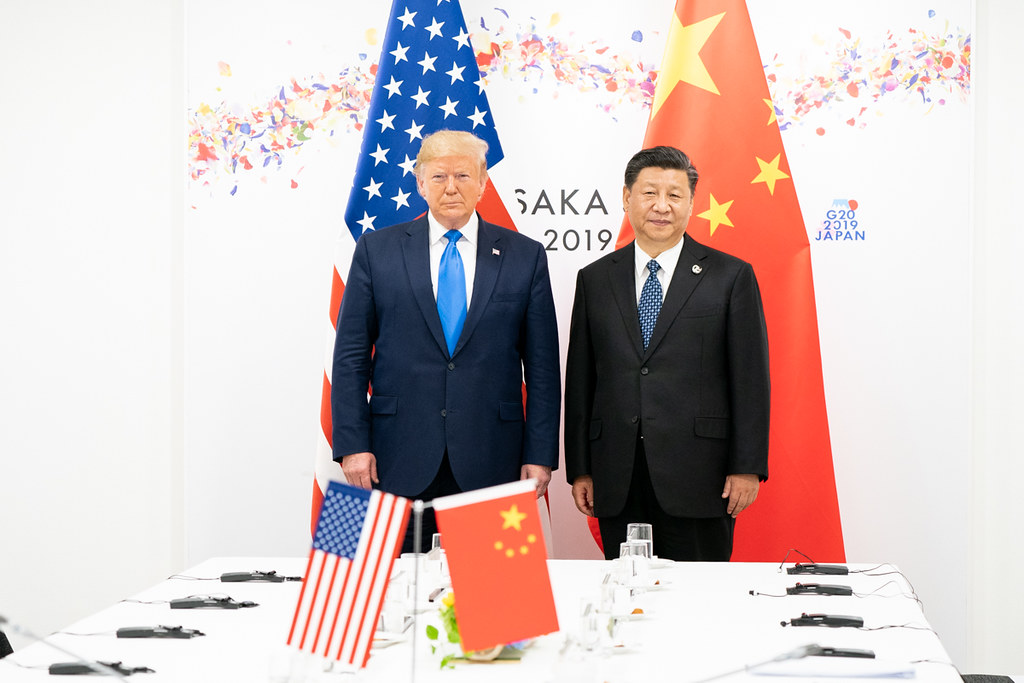U.S., China Move Toward October Trade Talks
President Trump on Sept. 12 announced that the U.S. would delay tariff increases on $250 billion of Chinese imports until Oct. 15, creating a possible opening for the two sides to reach an agreement during a round of negotiations scheduled for early October. In response, China exempted U.S.

President Trump on Sept. 12 announced that the U.S. would delay tariff increases on $250 billion of Chinese imports until Oct. 15, creating a possible opening for the two sides to reach an agreement during a round of negotiations scheduled for early October. In response, China exempted U.S. soybeans, pork and other farm goods from additional tariffs. The exemptions are welcome news to American farmers, who are among those suffering the most from the trade conflict. The cease-fire raised hopes for an interim deal during the upcoming talks, which will include Vice Premier Liu He, China’s top trade negotiator, as well as U.S. Trade Representative Robert Lighthizer and U.S. Treasury Secretary Steven Mnuchin.
The Office of the U.S. Trade Representative (USTR) also announced last week that it would remove tariffs on some 400 goods imported from China, ranging from dog collars to printed circuit boards for graphics processors to laminated floor boards. Analysts say the move was designed to provide relief to U.S. corporations that could not easily find alternative suppliers.
Late last week, deputy-level Chinese negotiators met with their counterparts in Washington to set the agenda for October’s principal-level negotiations. China’s state-run Xinhua news agency reported on Sept. 20 that the October talks would go forward, calling the deputy-level meetings “constructive.” In a separate statement, the USTR confirmed that the U.S. would welcome the Chinese delegation and said that the meetings had been “productive.”
The upcoming talks will be the 13th round of negotiations since Trump’s China tariffs first took effect in July 2018, and the first since July of this year, when brief meetings in Shanghai produced little progress. The agenda for the October talks remains unclear, and President Trump has sent mixed signals about what kind of deal the United States is prepared to accept. On Sept. 12, Trump told reporters he would be open to an “interim” deal that would solve the “easy” issues first. Analysts have since speculated that such a deal could involve a commitment from the Chinese side to purchase more American agricultural goods if the United States postpones further tariffs and eases restrictions on Huawei. But on Sept. 20, the president rejected suggestions that the United States would accept an interim deal, telling reporters that intellectual property theft would need to be a part of any agreement between the two sides. Speaking to the UN General Assembly on Sept. 24, the president criticized China for currency manipulation and intellectual property theft, noting that he “will not accept a bad deal.”
Even if an interim deal were struck in the October talks, it would likely leave thornier issues unresolved. Disputes over cybersecurity, intellectual property and broader market access reform in China are likely to remain sticking points. Recent developments indicate that sentiment in Washington toward China continues to harden. On Sept. 12, a group of bipartisan lawmakers, including Senate Minority Leader Chuck Schumer, requested a list of companies operating in the United States that were owned by the People’s Liberation Army, as part of an effort to reduce economic espionage. In an interview, Democratic Sen. Chris Coons said Trump was right to make intellectual property a “center point of the rising and sustained trade conflict.”
Political tensions over Hong Kong may also complicate trade discussions. On Sept. 18, House Speaker Nancy Pelosi welcomed pro-democracy activists from Hong Kong to Washington. In response, China called on the United States to “stop bolstering radical violent forces” advocating for independence in Hong Kong.
China Pushes On With Corporate Social Credit Rollout
On Sept. 16, China’s National Development and Reform Commission (NDRC) issued a circular saying it had assigned social credit ratings to a broad range of companies, a measure taken to further implement the evolving corporate dimensions of China’s broader social credit system. Announced in 2014 but not yet fully implemented, the social credit system comprises data collection practices meant to “promote integrity” and improve lawfulness by better tracking relevant behavior of citizens and businesses. As part of this effort, the NDRC intends to assign to all companies a “social credit rating,” relying on an algorithm that penalizes for infractions including failure to repay debts, evasion of taxes and other legal obligations, fraud, endangerment of public safety, and violation of sector-specific regulations. Government documents state that companies with poor ratings may lose “access to preferential policies” or face “stricter levels of administrative punishment.” Other analysts have hypothesized that punishments could also include restrictions against purchasing land, procurement bidding and borrowing.
The NDRC circular notes that the agency has finished initial assessments of social credit ratings for 33 million companies registered in China, which could include U.S. firms. The NDRC, according to its report, will send results to local government authorities, who will be responsible for meeting with the management of companies assigned “poor” ratings and implementing plans to correct problematic behavior. This round of corporate assessments, which will serve as a pilot for the full program’s rollout later next year, comes in the wake of several smaller, sector-specific assessments that the NDRC has previously conducted. Foreign businesses fear that China will use the credit system, once fully implemented, to coerce firms into complying with government objectives.
The NDRC circular did not make clear how many foreign firms, if any, the agency included in this latest wave of assessments. However, the corporate social credit system is widely expected to cover all firms registered in China, including foreign ones, by its full rollout in 2020. China’s steps toward full implementation are already causing concern for foreign companies, which fear that China will use the system as a means of retaliation in global disputes and a method of furthering political goals. Last August, the European Union Chamber of Commerce issued a report on the system’s potential impact on foreign businesses and concluded that the corporate social credit system “could mean life or death for individual companies.” However, the report did not characterize the program in a solely negative light. The Chamber of Commerce’s president, Joerg Wuttke, observed in an Aug. 28 press conference that the new system may leave less room for “fiddling by government officials”—thereby improving the rule of law and leveling the playing field for foreign companies.
These fears are particularly acute given that other Chinese government actions this year have indicated China’s willingness to target foreign firms during international disputes. In May, after the U.S. put Huawei on an “entity list” restricting its ability to import components from American firms, China announced that it would maintain an “unreliable entity list” of foreign companies that, many fear, it will subject to state sanctions.
Since the program’s announcement in 2014, foreign commentators have expressed concerns that China may use corporate social credit to coerce foreign companies and that compliance with the program will raise costs for business. Others, such as Jeremy Daum, senior fellow at Yale Law School’s Paul Tsai China Center, have pointed out that corporate social credit largely does not “impose new requirements for business,” aiming rather to better enforce existing regulations. Chinese government authorities emphasize that the goal of corporate social credit is to safeguard against corporate malfeasance and to create a “fair, transparent and predictable” business environment.
In Other News
- On Sept. 16, the U.S, Department of Justice announced the arrest of Zhongsan Liu, who was charged with “conspiracy to fraudulently obtain U.S. visas for Chinese government employees.” Liu, a resident of Fort Lee, New Jersey, managed the New York office of the China Association for International Exchange of Personnel—a Chinese government agency that recruits top U.S. scientists, engineers, academics and other experts to work in China. According to FBI Counterintelligence Assistant Director John Brown, Liu assisted “employees of the government of the People’s Republic of China” in obtaining “visas under the guise of research scholars, but in reality, their assignment was to recruit top U.S. talent to benefit the government of China.” Liu’s arrest comes as tensions remain high over the arrest of Huawei CFO Meng Wanzhou on Dec. 1 of last year, which Canada carried out at the United States’s request. (Shortly after Meng’s arrest, China detained two Canadian citizens.)
- A bipartisan group of senators introduced a bill on Sept. 18 that would ban federal agencies from purchasing drones from China or any other country that constitutes a national security threat. The ban would include buying from any entity that the secretary of homeland security deems “subject to influence or control by the government of the People’s Republic of China.” Lawmakers introduced this bill after government documents revealed that the U.S. Air Force and Navy purchased Chinese-made drones, despite a Pentagon prohibition against purchasing commercial, off-the-shelf drones last year. U.S. officials worry that reliance on Chinese drones creates risks for American critical infrastructure, though the U.S. Special Operations Command says that it has taken steps to mitigate cybersecurity issues from past Chinese drone purchases.
- On Sept. 21, China signed an agreement with the Solomon Islands to establish diplomatic relations after the latter nation cut diplomatic ties with Taiwan. The day before, Kiribati similarly cut ties with Taiwan, and it is also expected to recognize China shortly. As tensions between China and Taiwan have risen this past year, analysts believe China is attempting to convince countries to cut ties with Taiwan in order to “compress” Taiwan’s international presence. Accompanying these moves by Kiribati and the Solomon Islands has been a ramp-up in Beijing’s rhetoric against Taiwan and its current governing party, the Democratic Progressive Party. “As long as the DPP is in power,” read a Sept. 16 article from a Communist Party-run social media account, “sooner or later Taiwan will have zero diplomatic allies left.”
Commentary
For the Center for Strategic and International Studies, Stephanie Segal and Dylan Gerstel analyze growing concerns that international scientific collaboration could pose economic and national security risks to the United States. Michael Greenwald of the Belfer Center explores the potential impact of China’s digital currency project on the U.S. dollar and the international financial system. Kristine Lee examines China’s growing influence at the United Nations, including the way that those positions may affect technology standards such as through Chinese leadership of the International Telecommunication Union. For Brookings, Jeffrey Bader compares the evolving situation in Hong Kong to a Shakespearean tragedy; he argues that the United States should voice support for a peaceful pro-democracy movement while encouraging protestors to find an exit ramp.
After an interview with Huawei CEO Ren Zhengfei, Thomas Friedman explores the complexity of Huawei’s relationship to the broader trade conflict. For SupChina, Lucas Niewenhuis takes on the question of whether China’s international infrastructure projects count as “debt-trap diplomacy.” For the Mercator Institute for China Studies, Kai von Carnap and Selina Morell argue that Europe’s cooperation with China in space poses economic and security risks.
On Lawfare, Alex Campbell identifies a shift in U.S. cyber policy toward China—from deterrence to engagement—and argues that China has failed to recognize this shift. Richard Bush takes a historical approach to explain how the protests arose in Hong Kong. Finally, Amy Zeng analyzes the implications of heightened U.S. military activity in the Indo-Pacific.






